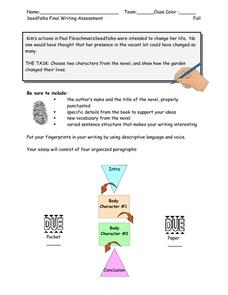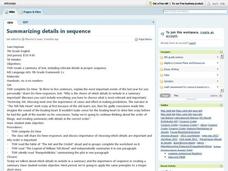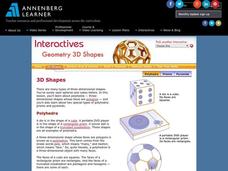Curated OER
Seedfolks Final Writing Assessment
Wrap up a study of Seedfolks with a final essay. Writers can draft their essays by following the steps and filling in the organizer provided here. The packet begins with a prompt, includes a few basic requirements, and provides an...
Curated OER
Sensory Elements in the Environment
Students verbally and visually identify visual elements found around them everyday.
Curated OER
The Literary Element of Theme
In this recognizing the theme in a story worksheet, students read and review the five main steps of how to identify the theme in a story.
Curated OER
Fabulous Fairy Tales
Students examine how story telling using literary elements found in fairy tale genre is one way to read and retell, discuss and analyze, as well as write and produce their own fairy tales.
Curated OER
Story Pyramids
Young writers generate descriptive words. They use pictures of various landscapes (from books, magazines, or the Internet) and complete a story pyramid. The pyramid (included here) asks to describe the main character, the setting, and...
J. Paul Getty Trust
Still-Life Painting: Arranging Nature—Lesson 1
Art learners examine still-life arrangement images and respond to a series of prompts. In a whole-class discussion, pupils list elements and qualities that still-life paintings can have. After instructors create an arrangement and model...
Curated OER
Revolutionary News Network
Seventh graders study events leading to, during and resulting from the American Revolution. They review elements of a political cartoon. They create and dramatize a scene from a Revolutionary War novel.
Curated OER
Mark Twain: Straddling the Civil War
Mark Twain's life, politics, writing, and role as a mirror of pre- and post-Civil War American culture are the focus 11th and 12th graders in this section from an expansive author study. A critical writing assignment comparing Twain to...
Curated OER
Describing Paintings: Calm or Stormy
Young writers use nouns, verbs, and adjectives to describe details in two paintings. One depicts a sunny landscape, and the other shows a cloudier view. They write a narrative inspired by the paintings, paying attention to transitional...
Armory Center for the Arts
Place Value Collage
How can art represent math? Use a lesson on place value collages to illustrate the different meanings that numbers have in their designated places. Kids observe photographs and paintings that show place value, then work on their own.
Syracuse City School District
Greek and Latin Roots, Prefixes, and Suffixes
How can adding a prefix or suffix to a root word create an entirely new word? Study a packet of resources that focuses on Greek and Latin roots, as well as different prefixes and suffixes that learners can use for easy reference.
Curated OER
Summarizing Details in Sequence
Seventh graders write a few sentences explaining the most important events of their lives during the past year. As a class, they discuss why they chose the elements they did for their sentences. To end the lesson, they read a variety of...
Curated OER
Getting to Know Characters
This set of worksheets constitutes enough work and materials to be considered a lesson. They guide readers through a process of exploring characters and their motivations, and writing a paragraph about them. Here are seven handouts that...
Reed Novel Studies
From The Mixed Up Files Of Mrs. Basil E. Frankweiler: Novel Study
Claudia Kincaid decides to run away to bring some excitement to her life, but she never expects the adventure she finds. A helpful study guide takes readers through the novel From the Mixed Up Files of Mrs. Basil E. Frankweiler....
Reed Novel Studies
The Great Gatsby: Novel Study
Some people believe that no matter how hard a man works, the American dream will always remain out of reach. A study guide for The Great Gatsby explores the themes, such as the illusory American dream, and elements of F. Scott...
Curated OER
Illusions of Depth
Learning to create depth when painting or drawing takes skill and the ability to understand how things should be placed on the canvas. The class will use the Charles Deas painting Long Jakes to learn about composition, sharing...
Annenberg Foundation
Geometry 3D Shapes: Euler's Theorem
How do you get a theorem named after you? Euler knows what it takes! The third lesson of five asks pupils to use an interactive activity to compare the faces, vertices, and edges of seven different three-dimensional solids. They use...
Annenberg Foundation
Geometry 3D Shapes: 3D Shapes
Explore vocabulary related to three-dimensional shapes. An instructional website describes the characteristics of different geometric solids. Learners can use an interactive component to view nets, faces, vertices, and edges of common...
Planet e-Book
Les Miserables
Many consider Les Miserables to be one of the greatest novels ever written. An eBook version of Les Miserables by Victor Hugo contains the entire text, translated from the original French. Each section is organized into books and...
Media Smarts
Looking at Newspapers: Introduction
A scavenger hunt introduces class groups to the different sections of newspapers and the different types of articles found in each section.
Sundance
Teaching Strategies: The Giver
Can utopia be achieved? Included here are three literature worksheets to pair with Lois Lowry's The Giver. Pupils work in groups to come up with solutions to society's issues, individuals back up a statement related to a topic in the...
Curated OER
Cultural Creation Myths
Students write original plays based on supernatural explanations of existence. In this cultural creation myths lesson, students listen to five different stories about supernatural creation. Students record similarities and differences in...
Curated OER
Rhytym in Interior Design
Students demonstrate the use of rhythm in interior design. They create a sample page showing five different elements of rhythm as it is used in visual art. These elements include: repetition, gradation, transition,
opposition, and...
Curated OER
Music Composition
Students compose a simple melody using the notes of the D Major Scale. Criteria/Rubric for evaluation is provided with variations depending on skill level of students. A minimum of one forty-five minute class period is needed for this...
























